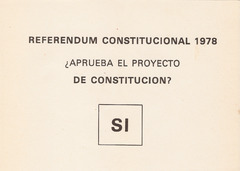1978 Spanish constitutional referendum facts for kids
On Wednesday, December 6, 1978, a special vote called a referendum took place in Spain. People were asked if they approved of a new set of rules for the country, known as the Spanish Constitution. This new constitution had just been agreed upon by the Spanish Parliament, called the Cortes Generales, on October 31, 1978.
The question on the ballot was simple: "Do you approve of the Constitution Bill?" (Spanish: ¿Aprueba el Proyecto de Constitución?). Most people said "yes." About 91.8% of the votes were in favor of the new constitution. A large number of people voted, with 67.1% of eligible voters participating.
Contents
Why Spain Needed a New Constitution
The new constitution was very important for Spain. It was designed to replace all the old laws from the time when Franco ruled Spain. During the Franco era, Spain was not a democracy. The new constitution aimed to change Spain into a constitutional monarchy. This meant the King would still be the head of state, but his powers would be limited by the new laws.
How Spain Became a Democracy
Creating a democratic system in Spain was a big challenge. It was made possible by a law passed in 1977, called the Political Reform Act. This act was the last of the old laws from Franco's time. It was written by Torcuato Fernández-Miranda, who led the old parliament.
The law was supported by Prime Minister Adolfo Suárez and King Juan Carlos. This new law allowed political parties to be legal again. It also led to a democratic election for a special group called the Constituent Cortes. This group then worked together to write the new Spanish Constitution.
Referendum Results: What People Voted For
The referendum asked people to approve the new constitution. The results showed strong support for this change across Spain.
The Main Question Asked
The question voters answered was:
| Question |
|---|
|
How Regions Voted on the Constitution
The table below shows how different regions in Spain voted. You can see how many people were allowed to vote, how many actually voted, and the percentage of "yes" and "no" votes in each area.
| Region | Electorate | Turnout | Yes | No | |||
|---|---|---|---|---|---|---|---|
| Votes | % | Votes | % | ||||
| Andalusia | 4,347,542 | 69.51 | 2,775,521 | 94.36 | 165,882 | 5.64 | |
| Aragon | 894,403 | 73.58 | 579,734 | 92.90 | 44,287 | 7.10 | |
| Asturias | 864,796 | 61.79 | 473,348 | 91.34 | 44,874 | 8.66 | |
| Balearic Islands | 450,115 | 70.18 | 282,598 | 94.88 | 15,251 | 5.12 | |
| Basque Country | 1,552,737 | 44.65 | 479,205 | 74.60 | 163,191 | 25.40 | |
| Canary Islands | 879,963 | 62.90 | 508,668 | 95.46 | 24,174 | 4.54 | |
| Cantabria | 374,559 | 71.15 | 222,559 | 87.01 | 33,232 | 12.99 | |
| Castile and León | 1,950,813 | 71.37 | 1,184,361 | 90.28 | 127,545 | 9.72 | |
| Castilla–La Mancha | 1,207,525 | 73.82 | 751,614 | 87.74 | 105,034 | 12.26 | |
| Catalonia | 4,398,173 | 67.91 | 2,701,870 | 95.15 | 137,845 | 4.85 | |
| Extremadura | 765,235 | 70.51 | 481,808 | 92.40 | 39,637 | 7.60 | |
| Galicia | 2,107,613 | 50.20 | 942,097 | 93.84 | 61,892 | 6.16 | |
| La Rioja | 192,597 | 72.46 | 120,847 | 91.70 | 10,940 | 8.30 | |
| Madrid | 3,047,226 | 72.23 | 1,896,205 | 89.49 | 222,638 | 10.51 | |
| Murcia | 630,268 | 71.44 | 408,722 | 93.59 | 27,975 | 6.41 | |
| Navarre | 361,243 | 66.63 | 182,207 | 81.70 | 40,804 | 18.30 | |
| Valencian Community | 2,545,481 | 74.14 | 1,676,680 | 92.72 | 131,664 | 7.28 | |
| Total | 17,873,271 | 67.11 | 15,706,078 | 91.81 | 1,400,505 | 8.19 | |
| Sources | |||||||
Voting Challenges and Issues
Some news reports at the time mentioned that there were some problems with the voting process. For example, some people found it hard to vote, while others might have voted more than once.
Just three weeks before the referendum, the government changed the voting age from 21 to 18. This meant over 3 million more people could vote. This quick change led to some technical and administrative issues with the voter lists. Officials from the Interior Ministry admitted there were some errors in the voter records. This was partly because there wasn't a perfect official list of all voters.
See also
 In Spanish: Referéndum para la ratificación de la Constitución española para niños
In Spanish: Referéndum para la ratificación de la Constitución española para niños


